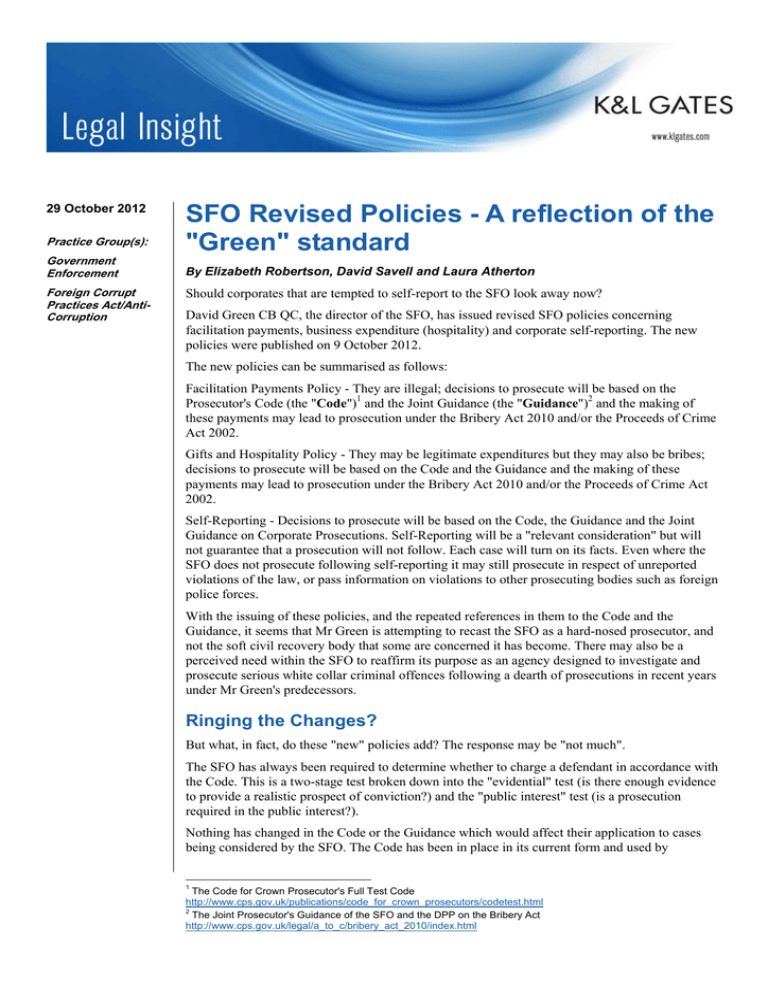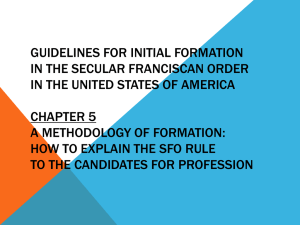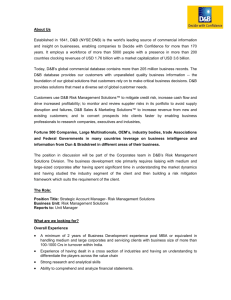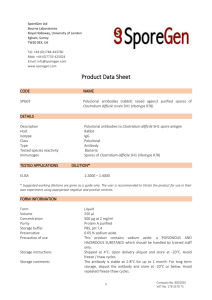SFO Revised Policies - A reflection of the "Green" standard
advertisement

29 October 2012 Practice Group(s): Government Enforcement Foreign Corrupt Practices Act/AntiCorruption SFO Revised Policies - A reflection of the "Green" standard By Elizabeth Robertson, David Savell and Laura Atherton Should corporates that are tempted to self-report to the SFO look away now? David Green CB QC, the director of the SFO, has issued revised SFO policies concerning facilitation payments, business expenditure (hospitality) and corporate self-reporting. The new policies were published on 9 October 2012. The new policies can be summarised as follows: Facilitation Payments Policy - They are illegal; decisions to prosecute will be based on the Prosecutor's Code (the "Code")1 and the Joint Guidance (the "Guidance")2 and the making of these payments may lead to prosecution under the Bribery Act 2010 and/or the Proceeds of Crime Act 2002. Gifts and Hospitality Policy - They may be legitimate expenditures but they may also be bribes; decisions to prosecute will be based on the Code and the Guidance and the making of these payments may lead to prosecution under the Bribery Act 2010 and/or the Proceeds of Crime Act 2002. Self-Reporting - Decisions to prosecute will be based on the Code, the Guidance and the Joint Guidance on Corporate Prosecutions. Self-Reporting will be a "relevant consideration" but will not guarantee that a prosecution will not follow. Each case will turn on its facts. Even where the SFO does not prosecute following self-reporting it may still prosecute in respect of unreported violations of the law, or pass information on violations to other prosecuting bodies such as foreign police forces. With the issuing of these policies, and the repeated references in them to the Code and the Guidance, it seems that Mr Green is attempting to recast the SFO as a hard-nosed prosecutor, and not the soft civil recovery body that some are concerned it has become. There may also be a perceived need within the SFO to reaffirm its purpose as an agency designed to investigate and prosecute serious white collar criminal offences following a dearth of prosecutions in recent years under Mr Green's predecessors. Ringing the Changes? But what, in fact, do these "new" policies add? The response may be "not much". The SFO has always been required to determine whether to charge a defendant in accordance with the Code. This is a two-stage test broken down into the "evidential" test (is there enough evidence to provide a realistic prospect of conviction?) and the "public interest" test (is a prosecution required in the public interest?). Nothing has changed in the Code or the Guidance which would affect their application to cases being considered by the SFO. The Code has been in place in its current form and used by 1 The Code for Crown Prosecutor's Full Test Code http://www.cps.gov.uk/publications/code_for_crown_prosecutors/codetest.html 2 The Joint Prosecutor's Guidance of the SFO and the DPP on the Bribery Act http://www.cps.gov.uk/legal/a_to_c/bribery_act_2010/index.html SFO Revised Policies - A reflection of the "Green" standard prosecution agencies since 19923, although it is currently undergoing a consultation for potential changes. The Guidance, which was published in March last year, has not changed 4. The revised facilitation payments and business expenditure policy statements are little more than restatements of the old policies. However, what has changed, in general terms, is the SFO's attitude to its role as a prosecuting body and, specifically, its publicised approach to self-reporting. A New Approach to Self-Reporting In its previous guidance on overseas corruption cases the SFO stated that it wished to "settle selfreferral cases…civilly wherever possible"5. However, given the long standing perception that the SFO has been too soft to act tough with corporate offenders, it is no surprise that Mr Green, the former head of the UK Revenue and Customs Prosecution Office, has decided to revise this message and to come out swinging instead against corporates who seek to avoid punishment for wrongdoing merely by confessing before they are (perhaps inevitably) caught. But will this really mean changes on the ground? Despite this repositioning of the authority, the SFO still knows that its most effective, efficient and valuable tool in fighting serious fraud is selfreporting, especially given the current economic climate. Therefore, whilst reminding the public that the SFO is, first and foremost, a prosecutor it cannot lose sight of the need to encourage corporates to come and see them once wrongdoing is discovered. So will the new policies assist in obtaining the difficult balance between the two apparently conflicting objectives of encouraging self-reporting whilst at the same time advertising that selfreporting will not save corporates from prosecution? How should corporates thinking of selfreporting, and those corporates that have recently self-reported, react to this mixed message? The Corporates' Response It is of course possible that the SFO's change in direction is more as a result of the negative press it has received, rather then a sea change in its attitude to whether corporates should be criminally prosecuted or dealt with on a civil basis, and that this posturing by the SFO will not result in any material differences to the way that it handles its current case load and those coming forward in the coming months. Indeed the only real change may be the language used and the way that the authority presents itself. However, in light of this hardening of the SFO's heart6 towards those who would self-report in order to avoid prosecution, corporates need to continue to consider, with their legal advisers: the nature of their offending; the cause; the losses to any victims; the merits in all the circumstances of self-reporting; and whether changes to the business, prior to self-reporting, may prevent such offending reoccurring and lessen the offence in the eyes of the prosecutor. In the case of corruption offences post-July 2011 it will be important for corporates to assess the adequacy of their anti-bribery and corruption procedures, prior to making any self-report, in order 3 Minor changes were most recently made in February 2010 Save for the removal of the reference to the old self-reporting policy 5 'Approach of the Serious Fraud Office to Dealing with Overseas Corruption 21 July 2009' (now withdrawn) 6 This is indicated by Mr Green's continual references in these new policies and his public announcements to the SFO's role as a prosecuting body. 4 2 SFO Revised Policies - A reflection of the "Green" standard to put their best foot forward in any negotiations on whether they should, in the circumstances, be spared prosecution. The production of these policies will not precipitate any dramatic changes to the advice given in relation to self-reporting. Prudent corporates that have already self-reported under the old guidance no doubt would have done so even in light of the newly published guidance. As rightly pointed out in the "Q and A" sections of the SFO website, "the new approach" is simply a restatement that the SFO's primary role is as an investigatory and prosecuting body. Nothing has changed and to the extent that companies have relied on any differences in previously issued SFO statements, "the SFO will consider such reliance in the context of the Full Code Test"7. The Balance The test under the Code is well known by legal advisors who make representations to agencies prior to them considering bringing charges against individuals and corporates. In making reference to the Code within its latest guidance the SFO has not changed the legal landscape. Recent history has highlighted the SFO's need to tread carefully in deciding whether to deal with serious criminal offences by way of civil recovery rather than prosecution. The Courts have made it clear that such deal brokering between defendants and prosecutors without judicial oversight will not be acceptable. From the Courts’ perspective, the role of the prosecutor is to prosecute. It is the judiciary's role to decide on the appropriate penalty for an offence. However, it is expected that the likely introduction of deferred prosecution agreements ("DPAs") into UK law next year will lead to an increased level of self-reporting, motivated by the desire of corporates to achieve exactly the opposite of this understood division of labour between the prosecutor and the Court; defendants will be looking to negotiate their penalty with the SFO (albeit with judicial oversight) rather than leaving it to the judge. Whilst the language of the new self-reporting policy is likely to worry businesses that may wish to self-report, that they will no longer receive the benefit of doing so, the main issue with selfreporting currently is not these policies but the potential legislative change that DPAs will bring. Whilst the responses to the consultation on DPAs are being considered, corporates will be cautious about self-reporting. The quicker the DPA process is finalised and made law the quicker corporates, and their legal advisers, will be able to consider whether they fall within the criteria or not and whether, as a result of the agreed structure of the DPA process, it will be beneficial for corporates to self-report. One thing is for certain, the new policies have made it much more important for the government to get the framework of DPAs absolutely right. Conclusion The SFO has made no substantive changes in these revised Policies, which merely restate the old principles and herald the new, tough talking "Green" stance. The SFO will continue to consider each case on its own merits by applying the Code to the facts of the particular case. Whilst the director of the SFO maintains support for DPAs the subtext will remain that those who come forward and cooperate reduce the likelihood that they will be prosecuted or increase the prospect that any prosecution will be for less serious offences with commensurately lesser penalties. 7 http://www.sfo.gov.uk/bribery--corruption/the-bribery-act/questions-and-answers.aspx 3 SFO Revised Policies - A reflection of the "Green" standard Authors: Elizabeth Robertson elizabeth.robertson@klgates.com +44.(0).20.7360.8255 David Savell david.savell@klgates.com +44.(0).20.7360.8266 Laura Atherton laura.atherton@klgates.com +44.(0).20.7360.8322 4



